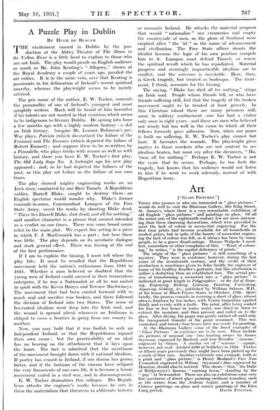A Puzzle Play in Dublin
BY HUGH DE BLACAM
THE excitement caused in Dublin by the pro- duction at the Abbey Theatre of The Moon in the Yellow River is'a little hard to explain to those who are not Irish. The play would puzzle an English audience as much as Mr. John Keating's " Allegory," shown at the Royal Academy a couple of years ago, puzzled the art critics. It is in the same vein, save that Keating is passionate in his delineation of Ireland's recent spiritual anarchy, whereas the playwright seems to be merely satirical. .
The pen name of the author, E. W. Tocher, conceals the personality .of one of Ireland's youngest and most sprightly writers. Much will be heard of him hereafter if his talents are not wasted in that cynicism which seems to be indigenous to literary Dublin. He sprang into fame a few months ago with a highly modern fantasya skit on Irish history. Imagine Mr. Lennox Robinson's pre- War plays, Patriots (which dramatized the .failure of the Fenians) and The Dreamer (which depicted the failure of Robert Emmet) ; and suppose these to be re-written by a Pirandello who plays tricks with reason as well as with history, and there you have E. W. Tocher's first play, The Old Lady Says No. A fortnight ago his new play appeared ; and, as he had depicted the failures of the past, so this play set heforc us the failure of our own times. • The play showed mighty engineering works on an Irish river, conducted by one Herr Tausch. A Republican soldier, Darrell Blake, sought to destroy them—an English spectator would wonder why. Blake's former comrade-in-arms, Commandant . Lanagan of the Free State Army, saved the works by shooting Blake dead. " There lies Darrell Blake, shot dead, and all for nothing," said another character in a phrase that seemed intended as a verdict on our times. There was some broad comic relief to the main plot. We expect fine acting in a piece in which F. J. MacCormick has a part ; but here there was little. The play depends on its acrobatic dialogue and stark general effect. There was hissing at the end of the first performance. • If I am to explain the hissing, I must tell where the play hits. It must be recalled that the Republican movement held the • nation's enthusiasm from 1916 to 1921. Whether a man believed or doubted that the young men of Ireland rould succeed in their tremendous enterprise, if lie was a Nationalist at all he was united in spirit with the Kevin Barrys and Terence MacSwineys. The movement that had been carried forward with so much zeal and sacrifice was broken, and there followed the division of Ireland into two States. The sense of frustrated idealism went deep into the Irish soul, and the wound is opened afresh whenever an Irishman is obliged to cross a frontier in going from one county to another.
Now, you may hold that it was foolish to seek an independent Ireland, or that the Republicans injured their own cause ; but the practicability of an ideal has no bearing on the attachment that it lays upon the heart. The fact is admitted that the overthrow of the movement brought down with it national idealism. If poetry has ceased in Ireland, if our drama has grown bitter, and if the fashions of the cinema have eclipsed the very lineaments of our own life, it is because a heroic movement ended in a civil war, and in discouragement.
E. W. Tocher dramatizes this collapse. His Repub- lican attacks the • engineer's works because he sees in them the materialism that threatens to obliterate historic or romantic Ireland. He attacks the material progress that would " rationalize " our creameries and empty the countryside of men, as the glens of Scotland were emptied after " the '45 " in the name of advancement and civilization. The Free State officer shoots the idealist because the logic of his own position compels him to it. Lanagan must defend Tausch, or renew the spiritual revolt which lie has repudiated. Material progress and seemingly impracticable idealism are in conflict, and the outcome is inevitable. Here, then, is Greek tragedy; but treated as burlesque. The treat- ment, I think, accounts for the hissing.
. The saying, " Blake has died all for nothing," stings an Irish soul. People whose friends fell, or who have friends suffering still, feel that the tragedy of the broken movement ought to be treated at least gravely. In this Christian island there are many prisoners still, some in solitary confinement—one has had a visitor only once in eight years—and these are men who believed not wisely. but too well in the cause to which all their fellows formerly gave adhesion. Now, when our peace is built on suffering, E. W. Tocher's play cannot but hurt. It lacerates the wounds. The playwright gives Matter to those mockers who are not content to see idealism beaten, but must cry after the dreamers, " Ha, 'twas all for nothing." Perhaps E. W. Tocher is not the cynic that he seems. Perhaps, he too feels the tragedy, but knows that his audience would not listen to him if he went to work solemnly, instead of with Hogarthian irony.


















































 Previous page
Previous page